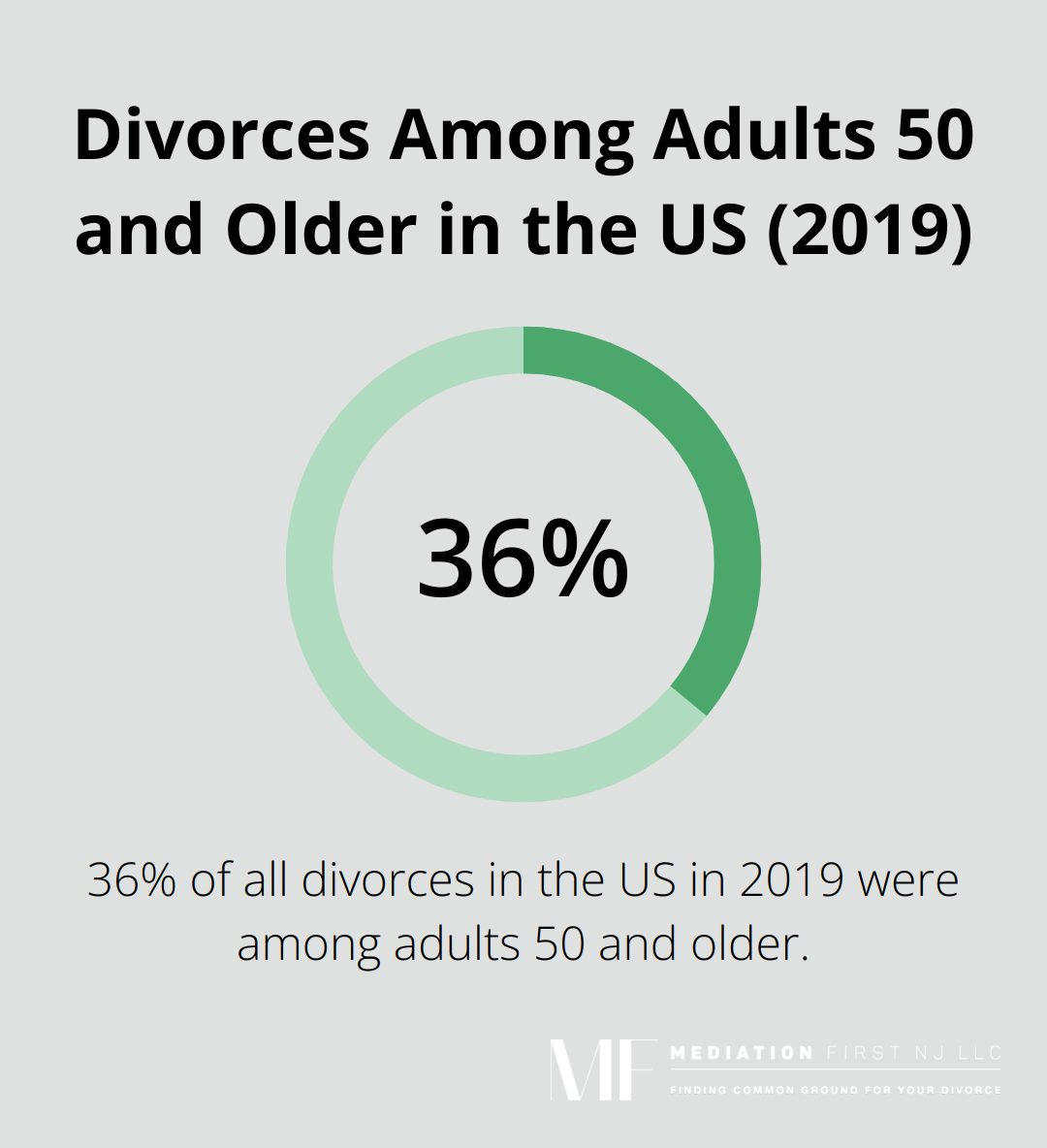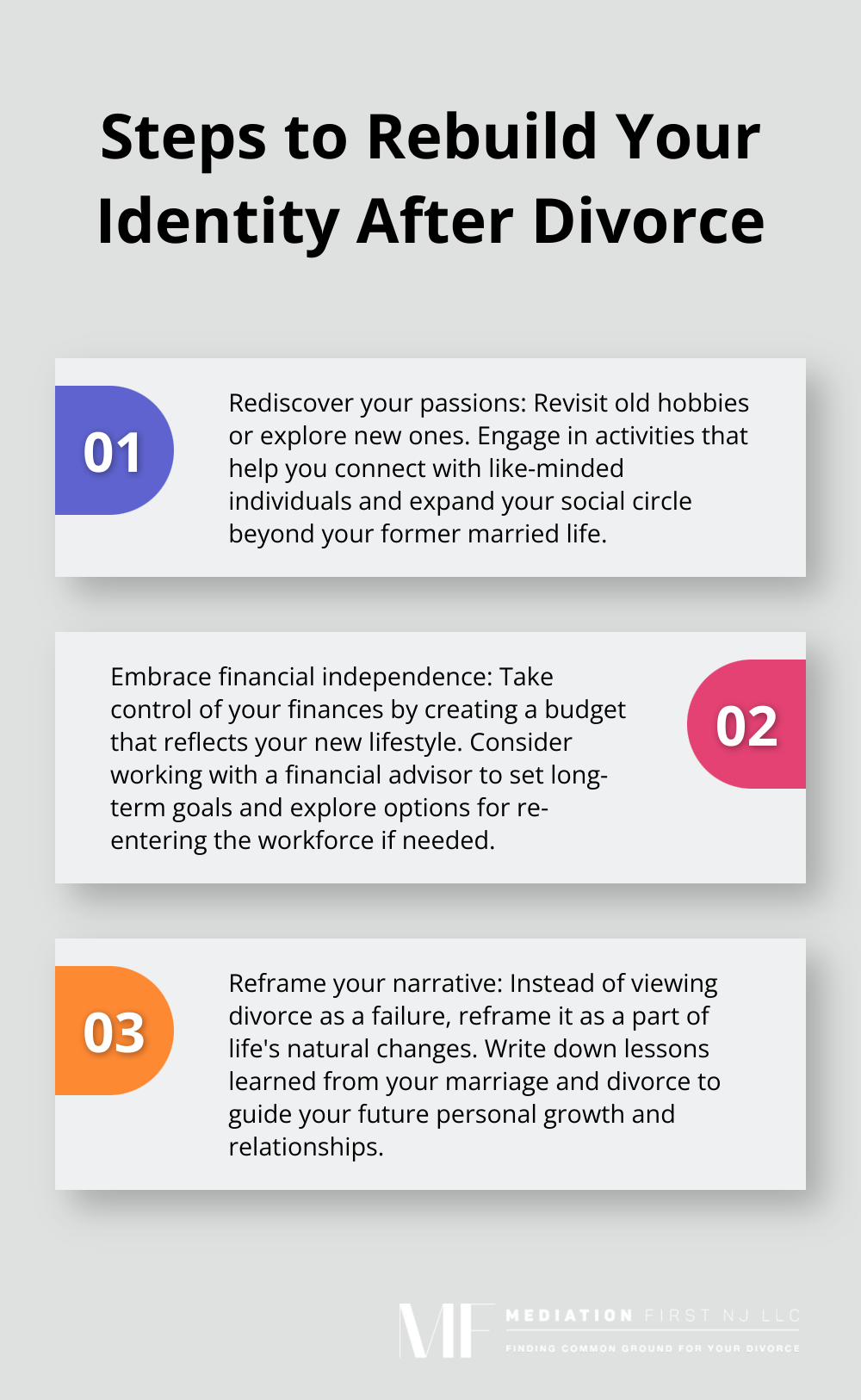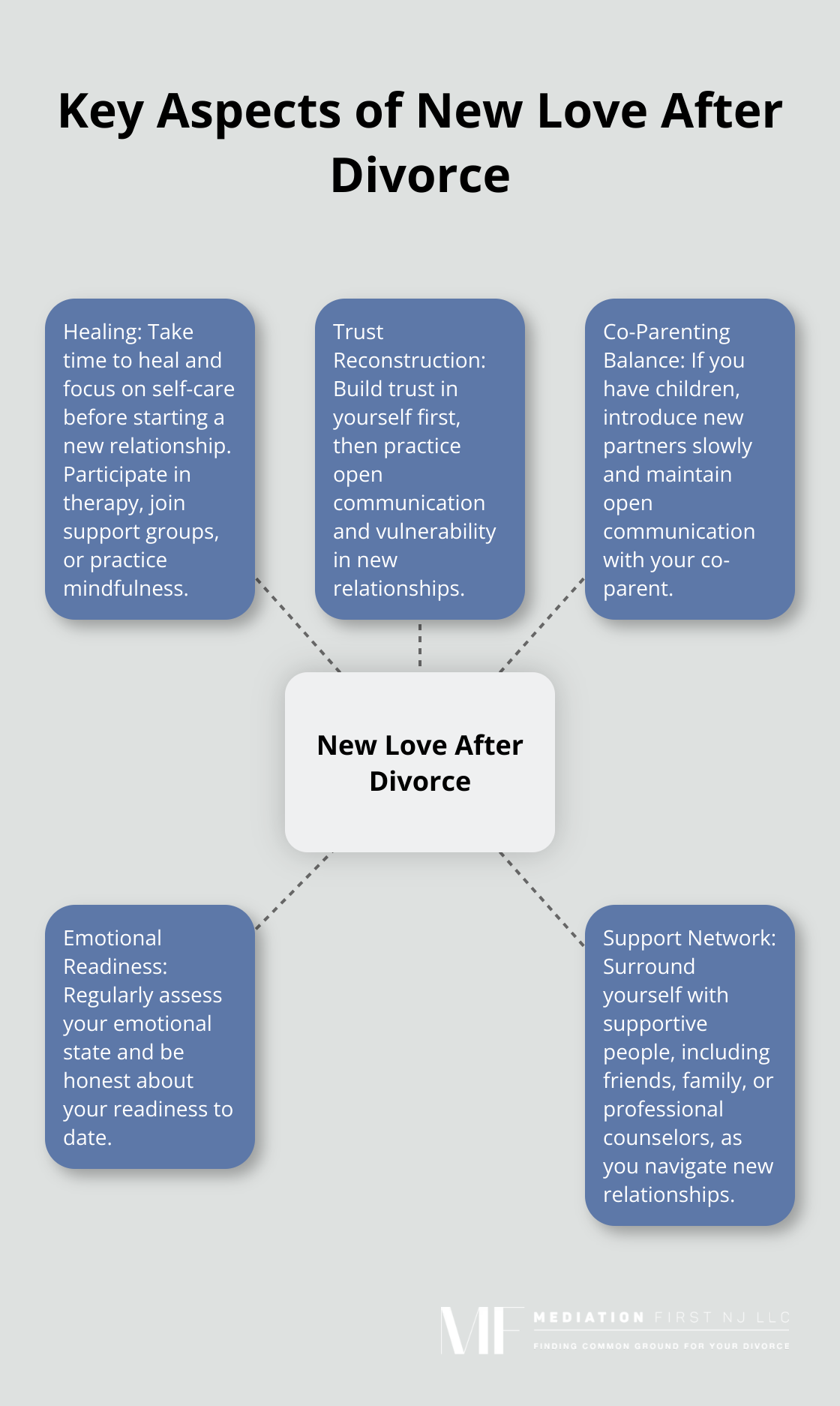Divorce is a complex journey that intertwines love and loss, challenging our emotional foundations. At Mediation First NJ LLC, we’ve witnessed countless individuals navigate this difficult terrain, each with their unique story.
This blog post explores the emotional realities of divorce, from grief to self-discovery and new beginnings. We’ll provide insights and strategies to help you move forward with resilience and hope.
The Emotional Rollercoaster of Divorce
Divorce unleashes a whirlwind of emotions that can overwhelm even the most resilient individuals. This chapter explores the emotional journey of divorce and offers practical strategies to navigate this challenging time.
The Grief Process in Divorce
Divorce often triggers a range of intense emotions. You might experience shock, denial, anger, bargaining, and depression – but not necessarily in a linear fashion. These emotions can hit you like waves, sometimes all in one day. Understanding that this is normal marks the first step towards healing.
A study found that in 2019, 36% of all divorces in the United States occurred among adults 50 and older. You’re not alone in this experience, and acknowledging your emotions paves the way for recovery.

Managing Emotional Turbulence
During divorce, you might feel a range of emotions – from relief to intense sadness, anger to anxiety. These feelings can be unpredictable and intense. Here are some practical ways to manage them:
- Track your emotions and identify triggers in a journal.
- Practice mindfulness or meditation to stay grounded in the present moment.
- Release emotional tension through physical activities like running or yoga.
- Consult a therapist or counselor specializing in divorce (this can provide invaluable support).
Coping with Loss and Betrayal
Feelings of loss and betrayal often accompany divorce, especially if infidelity played a role. These emotions can be particularly challenging to navigate. Here’s how you can cope:
- Allow yourself to mourn the end of your marriage (it’s okay to grieve the loss of your dreams and plans).
- Protect your emotional well-being by setting boundaries with your ex-partner.
- Rebuild your self-esteem through focused self-care.
- Share experiences and coping strategies in a support group for divorcees.
Healing takes time, and patience with yourself is key as you navigate this emotional rollercoaster of divorce. The next chapter will explore how to rebuild your self-identity after divorce, an essential step in moving forward and embracing new opportunities for personal growth.
Rebuilding Your Identity After Divorce
Rediscovering Your Passions
Divorce often creates a void in your sense of self. This phase presents an opportunity to rediscover who you are without your partner. Start by revisiting old hobbies or exploring new ones. Did you always want to learn photography? Now’s your chance. A study by the American Psychological Association found that people who engaged in new activities post-divorce experienced significant improvements in mental health outcomes.
Take a cooking class, join a book club, or volunteer for a cause you care about. These activities will not only fill your time but also help you connect with like-minded individuals, expanding your social circle beyond your former married life.
Embracing Financial Independence
Divorce often brings financial challenges, but it also offers a chance to take control of your finances. Research shows that women’s income tends to drop by over 20% following a divorce, while men’s income usually remains stable or even increases.
Create a budget that reflects your new lifestyle. Consider working with a financial advisor to set long-term goals. If you’ve been out of the workforce, explore options for re-entering. Websites like LinkedIn Learning offer courses to refresh your professional skills.
Reframing Your Narrative
It’s easy to view divorce as a failure, but this perspective can hinder your growth. Instead, reframe your divorce as a simple part of life’s natural changes. A study published in the Journal of Positive Psychology found that individuals who could find meaning in their divorce experience reported higher levels of well-being.
Write down three things you learned from your marriage and divorce. These insights can guide you in future relationships and personal growth. Consider starting a journal to track your progress and emotions throughout this transition.

Building a Support Network
During this time of change, surrounding yourself with supportive people becomes essential. Reach out to friends and family who uplift you. Join support groups for divorcees (either in-person or online) to connect with others who understand your experience.
Professional support can also prove invaluable. A therapist or counselor specializing in divorce can provide tools and strategies to navigate this transition. Many people find that working with a mediator (such as those at Mediation First NJ LLC) can help them approach the practical aspects of divorce with clarity and reduced conflict.
As you rebuild your identity post-divorce, you’ll likely encounter a mix of emotions about the prospect of new relationships. The next chapter will explore how to navigate this terrain, balancing healing with the possibility of new connections.
New Love After Divorce
Healing as a Priority
Before you start a new relationship, take time to heal. A study revealed that individuals who waited before dating after divorce reported higher relationship satisfaction in their new partnerships.
Focus on self-care and personal growth during this period. Participate in therapy, join support groups, or practice mindfulness. These activities will help you process your divorce experience and prepare you for healthier future relationships.
Trust and Vulnerability Reconstruction
Trust issues often arise after divorce. Start by building trust in yourself. Set small, achievable goals and follow through. This practice reinforces self-reliance and boosts confidence.
When you’re ready to date, be honest about your divorce experience. Open communication about past hurts and current boundaries fosters trust. Vulnerability is a strength (a study found that individuals who were more emotionally open in new relationships post-divorce reported higher levels of satisfaction).
Romance and Co-Parenting Balance
If you have children, new relationships add another layer of complexity. Introduce new partners slowly and thoughtfully. The American Academy of Child and Adolescent Psychiatry recommends waiting until a relationship is serious before introducing children to a new partner.
Maintain open communication with your co-parent about new relationships. Establish clear boundaries to ensure your dating life doesn’t interfere with your parenting responsibilities. Many individuals find that revisiting their parenting plan can help navigate these new waters smoothly.
Emotional Readiness Assessment
Take your time to ensure you’re emotionally ready for a new relationship. Your journey of self-discovery and healing will ultimately lead to more fulfilling connections in the future. Try to reflect on your emotional state regularly and be honest with yourself about your readiness to date.

Building a Support Network
Surround yourself with supportive people as you navigate new relationships. Friends, family, or a professional counselor can provide valuable perspectives and emotional support. Consider joining a support group for divorced individuals who are re-entering the dating world (this can offer insights from others who have been in your shoes).
Final Thoughts
Divorce marks a significant life transition, often accompanied by emotional turbulence and challenges. It also presents an opportunity for personal growth and self-discovery. The journey from heartbreak to healing is unique for each individual, but certain universal truths emerge.
Love and divorce intertwine in complex ways. While the end of a marriage can feel like the end of love, it doesn’t diminish your capacity to love or be loved. As you navigate this new chapter, remain open to the possibilities that lie ahead.
At Mediation First NJ LLC, we understand the complexities of divorce and offer mediation services to help you navigate this challenging time (with dignity and respect). With the right support, mindset, and tools, you can move through this transition and emerge stronger, wiser, and ready for whatever the future holds.

